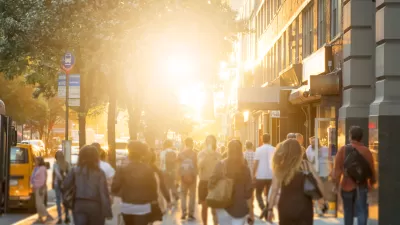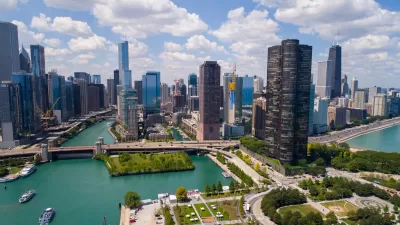Massive chain drug stores have become integral members of the urban fabric, for better or worse, but widespread store closures and security practices have come to symbolize urban decline. The dynamic must be monitored.

Shopping at big-name pharmacies like CVS, Rite Aid, and Walgreens involves so many products behind plexiglass, “It’s like shopping at a pharmacy 100 years ago, with a white-aproned clerk pushing around a ladder to grab your tinctures and tonics,” writes Henry Grabar for Slate.
The corporate behemoths are the frontline for one of the main talking points in the culture war that seems to focus on cities more than ever before in 2022.
The changes in how these businesses operate are a sign of large, era-defining forces at work, according to Grabar. “It’s a fundamental change for a business that transformed urban life with its breakneck expansion in the first decades of the 21st century. And it comes alongside an industrywide retrenchment, as that exuberant overbuilding spree comes face to face with remote work and e-commerce.”
The evidence of the retrenchment is perhaps less conspicuous that the plexiglass, but these drug stores, including flagship urban locations, are closing all over the country.
The article includes a sober discussion of the shoplifting issue (“You can be skeptical of companies playing the blame game, but retail experts are certain: If shoplifting weren’t chipping into profits, you wouldn’t see plastic cases at all.”) as well as a proposed solution for the challenges: a federal bill supported by the National Association of Chain Drug Stores that would require online marketplaces to verify the identify of third-part sellers.
According to both this article and a February article by Jack Denton for Curbed, however, shoplifting isn’t the cause of store closures. Fundamentals are, and that fact will have significant consequences for the future of cities and communities.
FULL STORY: The Rise and Fall of the Drugstore Chains

Alabama: Trump Terminates Settlements for Black Communities Harmed By Raw Sewage
Trump deemed the landmark civil rights agreement “illegal DEI and environmental justice policy.”

Study: Maui’s Plan to Convert Vacation Rentals to Long-Term Housing Could Cause Nearly $1 Billion Economic Loss
The plan would reduce visitor accommodation by 25% resulting in 1,900 jobs lost.

Planetizen Federal Action Tracker
A weekly monitor of how Trump’s orders and actions are impacting planners and planning in America.

Wind Energy on the Rise Despite Federal Policy Reversal
The Trump administration is revoking federal support for renewable energy, but demand for new projects continues unabated.

Passengers Flock to Caltrain After Electrification
The new electric trains are running faster and more reliably, leading to strong ridership growth on the Bay Area rail system.

Texas Churches Rally Behind ‘Yes in God’s Back Yard’ Legislation
Religious leaders want the state to reduce zoning regulations to streamline leasing church-owned land to housing developers.
Urban Design for Planners 1: Software Tools
This six-course series explores essential urban design concepts using open source software and equips planners with the tools they need to participate fully in the urban design process.
Planning for Universal Design
Learn the tools for implementing Universal Design in planning regulations.
Caltrans
Smith Gee Studio
Institute for Housing and Urban Development Studies (IHS)
City of Grandview
Harvard GSD Executive Education
Toledo-Lucas County Plan Commissions
Salt Lake City
NYU Wagner Graduate School of Public Service





























